Rescue workers are scrambling to find survivors and victims of the devastation wreaked by the worst floods to hit western Europe in living memory, which have left at least 170 people dead and dozens more missing.
Western Germany has suffered the worst impact of the deluge that also hit Belgium, Luxembourg and the Netherlands, leaving streets and homes submerged in muddy water and isolating entire communities.
With the death toll in Germany at 143 three days into the disaster, rescuers said more bodies were likely to be found in sodden cellars and collapsed homes.
"We have to assume we will find further victims," said Carolin Weitzel, mayor of Erftstadt, where a terrifying landslide was triggered by the floods.
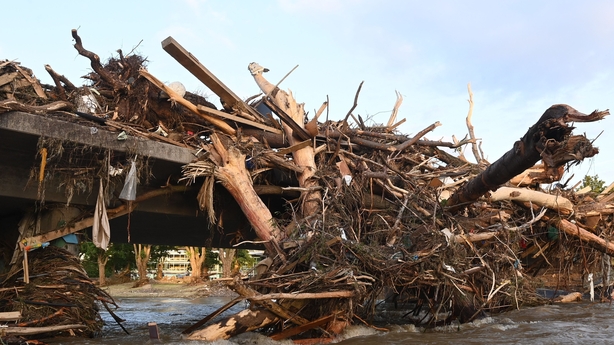
Chancellor Angela Merkel will visit the area tomorrow, travelling to Schuld in Rhineland-Palatinate state, a spokeswoman for the regional interior ministry said.
The Chancellor has called the flooding a national "tragedy" and promised support from the federal government to help the affected areas rebuild and recover.
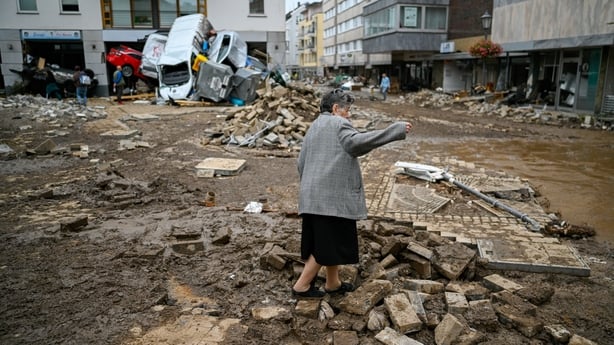
German President Frank-Walter Steinmeier toured the town of Erftstadt in the western state of North-Rhine Westphalia today, to survey the damage from a massive landslide caused by the extreme weather.
Ms Merkel's visit has been delayed because she only returned yesterday from a high-profile trip to Washington, her last official visit as chancellor.
Speaking alongside US President Joe Biden at the White House on Thursday, Ms Merkel said her "heart goes out to all of those who in this catastrophe lost their loved ones".
In Germany's worst-hit states of North Rhine-Westphalia and Rhineland-Palatinate, residents who fled the deluge were gradually returning to their homes and scenes of desolation.
"Within minutes, a wave was in the house," baker Cornelia Schloesser told AFP of the torrents that arrived in the town of Schuld, carrying her century-old family business with them.
"It's all been a nightmare for 48 hours, we're going round in circles here but we can't do anything," she said, surveying the heaps of twisted metal, broken glass and wood that have piled up at her former storefront.
In neighbouring Belgium, the death toll jumped to 24 with up to 20 people still missing and more than 21,000 left without electricity in one region.
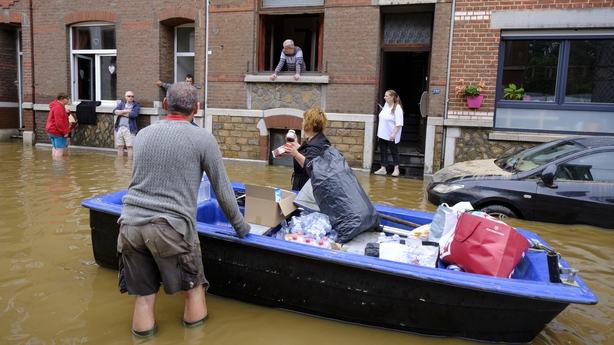
Belgium's Prime Minister Alexander de Croo headed to the town of Rochefort in the basin of the river Meuse to see the aftermath of what he has branded an "unprecedented" flood.
He was to be joined by European Commission president Ursula von der Leyen in the river valleys of eastern Belgium near the border with her native Germany, also badly hit.
Flood waters descended on densely inhabited valleys in the region around the Meuse river on Thursday, after days of intense rain.
Luxembourg and the Netherlands were also hammered by heavy rains, inundating many areas and forcing thousands to be evacuated in the city of Maastricht.
A burst dam in Germany's Heinsberg district 65km southwest of Duesseldorf overnight prompted the emergency evacuation of more than 700 residents.
In some affected areas, firefighters, local officials and soldiers, some driving tanks, have begun the colossal work of clearing the piles of debris clogging the streets.
"The task is immense," said Tim Kurzbach, mayor of Solingen, a city in the south of the Ruhr area.
The real scale of the disaster is only now becoming clear, with damaged buildings being assessed, some of which will have to be demolished, and efforts under way to restore gas, electricity and telephone services.
The disruption to communication networks has complicated efforts to assess the number still missing, and most roads in the submerged Ahr Valley are out of service.
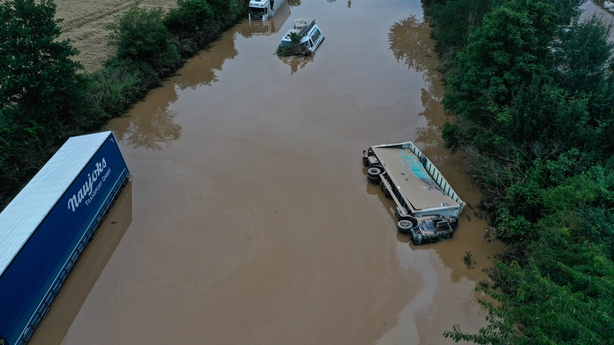
More than 90 of the dead lived in its Ahrweiler district, including 12 residents of a home for the disabled who drowned in the rising waters.
Roger Lewentz, interior minister for Rhineland-Palatinate, told local media up to 60 people were believed to be missing. More than 600 were injured.
The government has said it is working to set up a special aid fund, with the cost of damage expected to reach several billion euro.
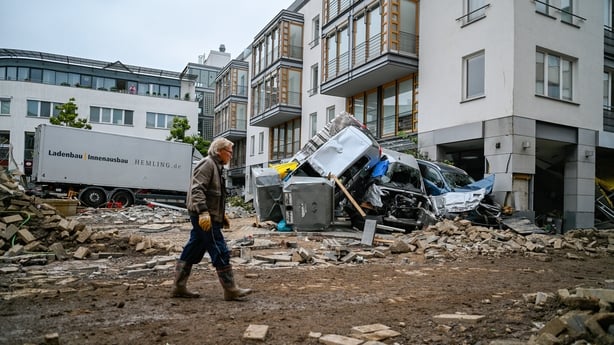
The devastating floods have put climate change back at the centre of Germany's election campaign ahead of a 26 September poll marking the end of Chancellor Merkel's 16 years in power.
Armin Laschet from Merkel's Christian Democratic Union, the frontrunner to succeed Chancellor Merkel, spoke of "a disaster of historic proportions".
News magazine Der Spiegel said the floods would train a spotlight on the candidates' response to climate change.
"There will be affirmations in the coming days that it's not an issue for the campaign but of course it is," it said.
"People want to know how politicians will lead them through something like this."
German reinsurance giant Munich Re said nations would have to expect rising "frequency and intensity" of natural disasters due to the climate emergency, calling for preventive action "which, in the final analysis, will be less costly".
Scientists have long said that climate change will lead to heavier downpours.
But determining its role in this week's relentless downpours will take at least several weeks to research, scientists said last night.

